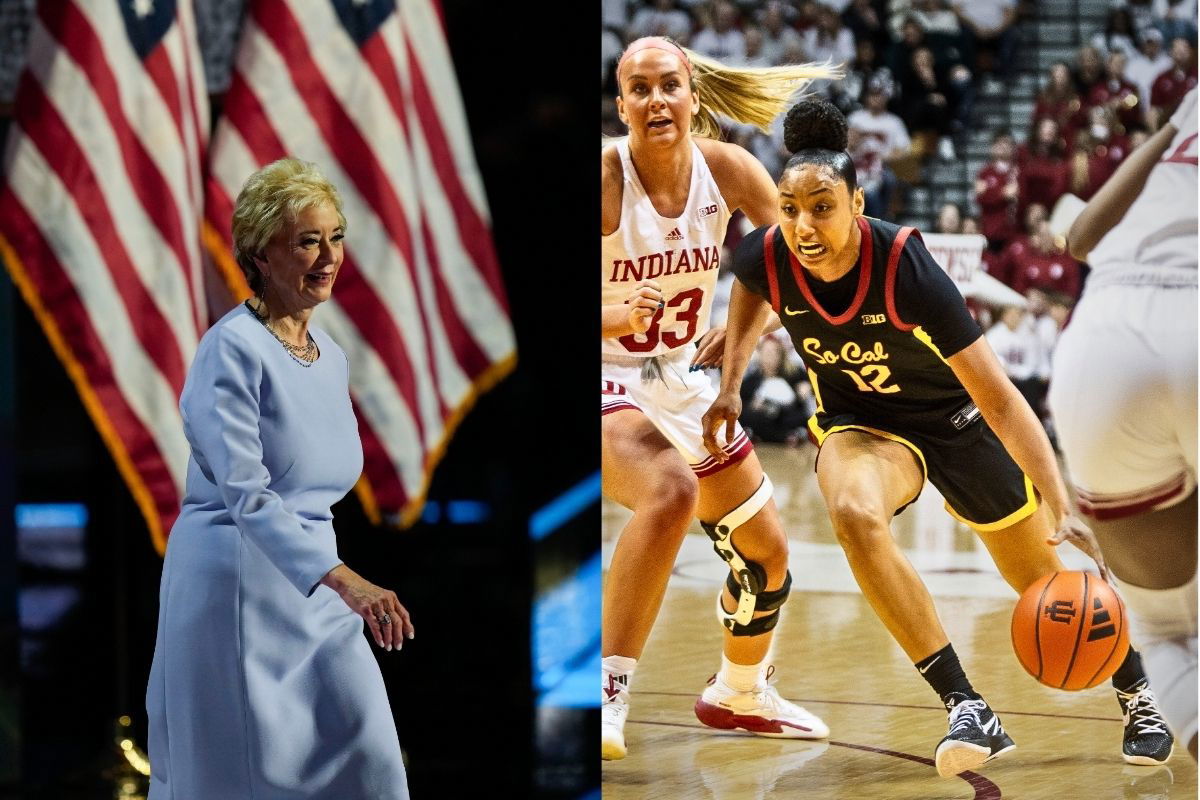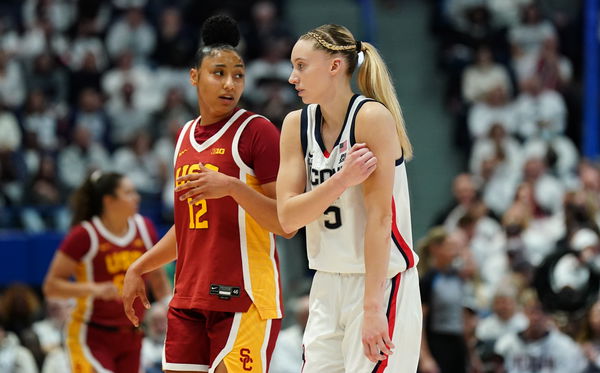
Imago
Credits : USA Network via Imagn

Imago
Credits : USA Network via Imagn
It has been long overdue for women’s college basketball to reach where it is today. From all the tiny steps to the major boost in the last two seasons, it indeed has come very far. However, can politics hinder the growth of NCAA WBB? With the news that Linda McMahon has been nominated as the new Secretary of Education under Donald Trump’s second administration, few anticipated the effects her potential appointment might have on the basketball court. Now, from locker rooms to boardrooms, murmurs of unease have grown louder. Could her leadership mark the end of key protections that have driven the growth of women’s college basketball?
Watch What’s Trending Now!
At the center of this storm is Title IX, the federal civil rights law that has reshaped the landscape of women’s sports. Enacted in 1972, Title IX has been the backbone of progress, ensuring equal participation opportunities, scholarships, and resources for women athletes.
However, Trump’s vow to dismantle the Education Department and transfer its powers to the states could spell disaster for Title IX. With the wife of the former CEO of WWE potentially at the helm, her first job could be to find ways to eliminate the department she would be appointed to oversee. Hence, also removing the possible pass to the law of equal pay.
ADVERTISEMENT
The Department of Education’s Office for Civil Rights recently published a memo that clarified that revenue-sharing payments from athletic departments would fall under the category of “athletic financial assistance” and must be distributed “proportionally” between male and female athletes.
While this comes as a big shocker for schools and colleges who expected to allocate most of their revenue share to men’s sports, it is again very important to note that this is just a memo and we are not even sure whether the Department of Education will exist in six months.
Chantel Jennings and Sabreena Merchant of The Athletic Women’s Basketball Show discussed the ongoing changes in leadership and the ongoing changes in the financial landscape of college football.
ADVERTISEMENT
Chantel says, “Obviously a new administration is coming in, there’s going to be new leadership in the Department of Education, Linda McMahon has been nominated. We don’t know when her confirmation process will be, when her hearing will be but no one knows what it’s gonna look like.” She continues, “Frankly no one knows if the Department of Education will exist in six months, like how is Title IX going to be applied.”
She further proceeds to talk about the memo released by the department, “This is a memo, this isn’t a law, this isn’t a ruling, it’s a memo, it’s guidance on what should happen here.” She further added, “This is guidance from an administration that is on it’s way out of the door… we also know that NCAA historically is not exactly the fastest acting body.”
ADVERTISEMENT
It is not a given that dissolution of any kind is going to happen any time soon. However, it does force everyone to beg the question of how it will impact the schools. There is no doubt that not all schools and not every division of a sport therein generates the same amount of revenue. Hence, an additional challenge for the colleges that are not like Duke or UConn that can earn significantly from their teams.
She also notes that it was the president of the NCAA, Charlie Baker who asked for this guidance and how Title IX was gonna be applied, “I think it’s interesting because Charlie Baker had specifically asked for this guidance from the federal government, like let us know how the Title IX is gonna apply here and obviously 50-50 was on the table, because for those of us who understand Title IX , that’s how it works. It must be proportional, but we will see! I think six months from now, all of this goes into effect (the memo) this July. So there have to be answers soonish but a lot could change over the next six months.”

Imago
Dec 21, 2024; Hartford, Connecticut, USA; UConn Huskies guard Paige Bueckers (5) and USC Trojans guard JuJu Watkins (12) on the court in the first half at XL Center. Mandatory Credit: David Butler II-Imagn Images
While there may be many changes occurring in college athletics once again, there is a silver lining. Per revenue sharing, athletes will also get a back pay. However, this will not apply to the players who were playing in college back in the 2000s. Moreover, according to the rule, there also needs to be an equal sharing of the generated revenue. Still, not all players will make an equal sum since there is no ruling to distribute the revenue equally amongst all the players. But seems like this is an endless discussion for now.
ADVERTISEMENT
Equal pay for men and women athletes: The debate that won’t go away
The age-old debate about equal pay for male and female athletes has been at the heart of discussions for years, and it’s a conversation that refuses to fade away. Despite the meteoric rise of Caitlin Clark, Angel Reese, and JuJu Watkins in recent years thanks to Title IX, people still don’t think equal pay should exist.
ADVERTISEMENT
Senator Ted Cruz released a statement after the Department of Education released the memo about proportionate pay. He described it as a ”death blow” to many college athletic programs and that it should be stopped once Donald Trump takes over.
Speaking with Yahoo Sports, he said, “This is a great idea if Biden’s intent is to kill both men’s and women’s college sports. Mandating so-called equal pay when not all sports generate equal revenue will force some colleges out of athletics altogether. Everyone wants to be paid like Michael Jordan, but that’s not the way the world works.”
Top Stories
Sean Payton Announces Retirement Plans as Broncos HC Demands Improvement From Bo Nix & Co. Before Playoffs

Greg Biffle’s $4M Worth Prized Possession Still Without a Buyer Leaves NASCAR Fans Heartbroken

LIV Golf Braces for Another Possible Exit in Wake of Brooks Koepka Departure

Biff Poggi All But Confirms Bryce Underwood’s Michigan Future After Announcing His Own Departure

Roger Federer Draws Criticism from Swiss Government Chief for Tourism Boom in Country

NASCAR World Mourns as Former Watkins Glen President Michael Printup Passes Away at 60

What do you think about the statement made by Ted Cruz? Do you think it is valid? Or do you think men and women athletes should be paid equally? What are your thoughts about the recent memo released by the Department of Education? Do let us know!
ADVERTISEMENT
ADVERTISEMENT
ADVERTISEMENT
ADVERTISEMENT

